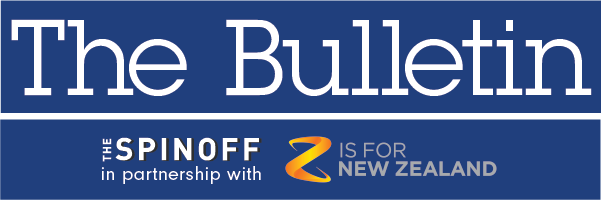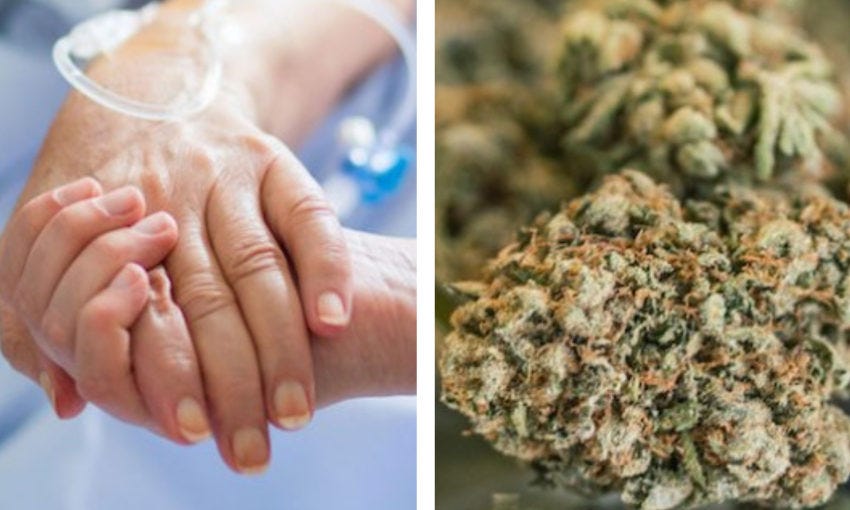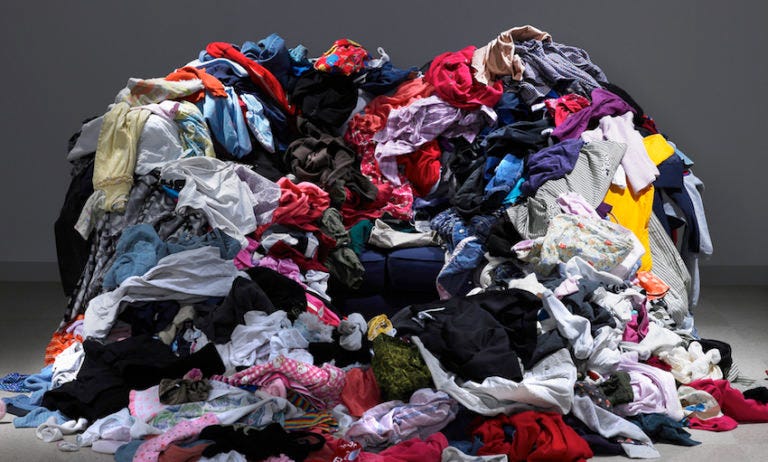Widely different outcomes loom for referendums
Euthanasia looks set to win easily, but cannabis legalisation is going up in smoke

Good morning and welcome to The Bulletin for Monday 28 September, by Alex Braae for The Spinoff. Presented in partnership with Z Energy.
In today’s edition: One referendum looks set for easy win while the other flounders, Labour still enjoys huge polling lead, and farming exporters warned on animal welfare and environment.

A new poll has set the scene for the likely outcomes of upcoming referendums on social issues. The One News Colmar Brunton poll has found the cause of cannabis legalisation is going backwards, with only 35% saying they'll vote for the Cannabis Legalisation and Control bill – that's down from 40% when the same question was asked in June. Meanwhile the End of Life Choice Act looks much more comfortable – 64% told the pollsters that they intend to vote for the legislation to come into force. We have explainers on what both involve – euthanasia is here, and cannabis legalisation is here.
On the cannabis one particularly, a lot of the discussion has revolved around how the campaign has taken place. As Newshub reports, Green Party list MP Chlöe Swarbrick has accused those of opposing the referendum of "seeking to cast fear and doubt, to basically try to tell people that to vote yes to implement a sensible, mature, adult framework - to reduce harm, to increase community wellbeing, to ensure our kids are not using this substance - is conflated with the idea of whether you support cannabis or not."
Which is all well and good as a point to make, but it's also sort of just describing politics and campaigning. Creating fear and doubt about a change is how groups against that change win their preferred outcome through democratic means. For more elaboration on this, I went along to see Family First leaders speak in Gore, and wrote this about a campaign machine which has ruthlessly outperformed legalisation advocates.
And how are political leaders responding to it all? Stuff reports former PM Helen Clark has come out as a yes on both referendums. Radio NZ reported last month that Judith Collins and the National caucus as a whole had opted to vote against cannabis legalisation. Meanwhile the PM Jacinda Ardern has been open about voting for the euthanasia referendum, but is refusing to say how she'll vote in the cannabis referendum. It's hard to know at this late stage whether an endorsement would make a difference or not, but had it been made earlier in the piece it probably would have changed the dynamics of the issue, given her extremely high levels of personal popularity. Stuff's Henry Cooke has called for her to come out and say which way she is voting, one way or the other.
Labour's support has absolutely plummeted in the latest Newshub Reid Research poll – to the dizzying heights of 50%. I joke, but the previous iteration of this poll had them on about 60%, so it's entirely true. National meanwhile are up 4.5%, but are still a shade under 30%. The poll suggests Act and the Greens will both cross the threshold, as they're both between 6-7%. But all other parties, including NZ First, are out. A point of interest in it all is that the New Conservatives are now slightly outpolling NZ First, with 2.1%.
A fascinating story about changing trade winds, and how New Zealand farmers will have to respond to them. Farmers Weekly reports that NZ’s top trade negotiator Vangelis Vitalis has warned that with protectionism rising around the world, there is greater vulnerability for New Zealand in terms of environmental and animal welfare standards. To paraphrase, other countries are looking at ways of shutting the door, and failures here will give them an excuse to respond in a more protectionist way.
Meanwhile, gross footage of intensive winter grazing done badly has emerged, reports Newshub. The video taken by campaigners shows animals dying in deep mud, after spending too long on the same patch of paddock. The footage is the footage, and it speaks for itself – however I would just say that I've seen a lot of farmland over the past couple of weeks, and haven't seen anything this bad anywhere.
The high barriers to getting protection orders are putting women at risk of violence, reports Stuff's Kirsty Johnston. The system as it currently exists puts the burden on women to keep themselves safe, and as a result the process can be incredibly expensive. The story itself follows one woman through her attempts to get legal protection from an abusive former partner, including pressure from her former partner's lawyer to sign a legally flimsy "undertaking" rather than getting a formal protection order.
Another strange turn for the story around holes in National's alternative budget: Stuff's Thomas Coughlan reports that both the party, and their economics vetting agency NZIER are standing by the numbers – the only trouble is, both are working off different sets of numbers. It has all got to that level of complexity where I can't make heads or tails of it, so for more clarity, I encourage you to read the story.
If arts policies could help sway your vote in the upcoming election, then this debate is one for you. Sam Brooks has picked out the moments in a forum that discussed issues like how the sector responds to Covid-19, the place of gambling money in funding the arts, and specific funding for Māori arts. The three MPs speaking on behalf of their parties also had to pick their favourite arts experience, and it was all fairly on brand.
In world news, Azerbaijan and Armenia have violently clashed in the last day, over the disputed region of Nagorno-Karabakh. As Al-Jazeera reports, tensions over the region have existed for decades, but the sorts of fighting being seen now is of a new intensity, and may herald all out war between the neighbouring countries.
A clarification: I fumbled out a very poor paraphrase of Hutt City mayor Campbell Barry on Friday, regarding what he said in this story about the costs of water infrastructure upgrades. My apologies for giving the impression that the high costs came as a surprise to him – rather the costs were simply higher than what had earlier been indicated.
Got some feedback about The Bulletin, or anything in the news?
Drop us a line at thebulletin@thespinoff.co.nz

Right now on The Spinoff: Laura O’Connell Rapira writes about why the 'leaders debate' no longer works as a format for making good judgements about politicians. Michael Andrew looks back on the Daktory, a place that took all the harm out of the process of getting cannabis. Emily Writes writes about getting surgery for endometriosis, and why more support for those with the condition is needed. Rose Jackson writes about the chronic waste problem in the fast fashion industry. Alie Benge writes about the unique challenges of trying to date while being a Christian. Michelle Langstone speaks to Dr James Jap, a palliative care physician at South Auckland’s Totara Hospice, about living a life built around giving people comfort in death. Celine Dam writes about perceptions of mental illness in her Vietnamese family. And Sherry Zhang has offered a robust defence of that most maligned of performing arts – being a clown.
For a feature today, an exploration of the origins of an increasingly popular slang term. Which is a boring way of saying, lessgo. Writing on the Pantograph Punch, Lana Lopesi has charted the etymology of a term you've probably heard a teenager say, but didn't quite get. Here's an excerpt:
Even with its origins on shaky ground, ‘lessgo’ has a firm place in a long line of brown urban colloquialisms – our own local brown vernacular if you like. I laughed when I read a Stuff headline that said, “Hey uce, here’s a mean-as guide to Kiwi regional slang”. I laughed because while, yes, at a stretch, uce can be described as Kiwi slang, the localised iteration of the Sāmoan uso (brother) is definitely used from a place of knowing only among certain people. I laughed because seeing the words that sit in your home as comfortably as unnoticed dust on the top of your fridge as a Stuff headline is awks as.
A few years ago Leilani Momoisea traced some of the origins of ‘poly slang’ for Metro magazine. In particular she was looking at words taken from Sāmoan and Tongan that had morphed into a local vernacular. Words like uce, but also bots, and of course skux, which in particular was well charted in this piece by Tayi Tibble. And a term my older cousins told me came from St Pat’s College in Wellington circa early 1990s as a Sāmoan transliteration of stud. And who is going to challenge their cousins’ urban legends? After all, them being my cousins gives me proximity to the origin point. It’s a win–win situation.
New Zealand UFC fighters have had a prolific weekend, with two major wins on the so-called 'Fight Island'. The NZ Herald's Christopher Reive reports it was headlined by Israel Adesanya defending his middleweight belt against challenger Paulo Costa, with a clinical 2nd round finish. It means he remains undefeated across 20 professional fights, and extends his record of taking down top ranked opponents. In terms of New Zealanders in the other fights on the card for UFC 253, Brad Riddell won his bout, but Kai Kara-France and Shane Young both lost. Incidentally, fight fan Don Rowe wrote a piece before the fight about Adesanya and the way he represents New Zealand in a completely new way.
That's it for The Bulletin. If you want to support the work we do at The Spinoff, please check out our membership programme




